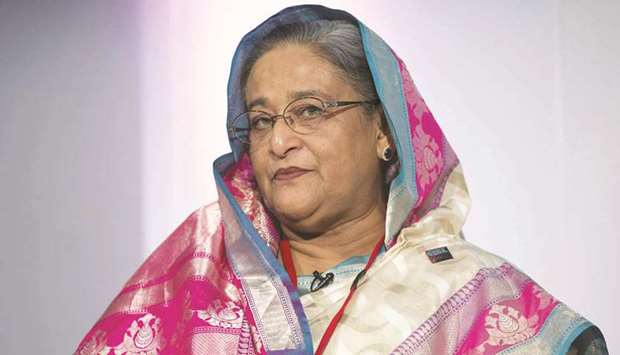“Necessary incentives will also be given if investors come up to invest in this sector in proposed 100 economic zones across the country,” she said at the inauguration of four-day Digital World, an ICT exposition, at Bangabandhu International Conference Centre with the theme ‘Ready for Tomorrow’.
The ICT division in collaboration with Bangladesh Association of Software and Information Services (BASIS) organised the exposition.
Hasina called upon all to work together to build Sonar Bangla as dreamt by Father of the Nation through turning the country into a welfare-oriented, peaceful, knowledge based digital one.
The PM said the dream she and her party had showed the country’s people before the 2008 general election to make ‘Digital Bangladesh’ is now a reality.
“In 2009 when our government assumed office, only 1.3mn people of the country used Internet and now it crossed 80mn within eight years of time,” she said.
She said that the ICT sector is expected to create about 2mn jobs in the country by 2021.
The prime minister also said people are now availing 200 types of government services ‘through mobile apps sitting at home.
Hasina said the government has taken steps to take the government services to the doorsteps of people by reducing the prices of Internet bandwidth, development of infrastructure and reducing the price of digital equipment to remove the digital divide.
She said an opportunity of a new industrial revolution has been opened for the country with the flourishing information technology and Bangladesh could play a leading role as it has huge number of young people which is the main element of industrial revolution.
Hasina said although the number of work force is decreasing in the developed world for the use of information technology but the age of 65% people of Bangladesh is under 35.
The government has already taken projects to turn the huge young force capable and suitable for the challenge using the demographic dividend of the country.
The prime minister said the prices of mobile sets and call rates have been reduced remarkably when her government in 1996 broke the monopoly of mobile phone sector by giving licenses to a number of
companies.
“At the same time, the services reached the remote areas of the country.”
She said her government set up union digital centres in 2010 which were extended to municipal and city corporation levels in 2013 and 2014.
Information services were made easily accessible to all through introduction of the biggest web portal with 25,000 government websites, she
added.
Mentioning that her government is trying to make the young generation self-reliant by engaging them in freelancing, the Prime Minister said Bangladeshi freelancers attain the second position and will
retain the top position soon.
The PM said the government made the ICT education compulsory at the secondary level from 2011 and supplying computers and other necessary materials free of cost alongside setting digital classrooms.
Hasina said training programmes on ICT have been expanded across the country as about 50,000 youths are being given skill development training.
She said about 10,000 ICT graduates are coming out every year from universities and they have been able to attract the eyes of the world community.

